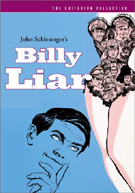Billy Liar
| John Schlesinger's Billy Liar was released in 1963 at the tail end of the British New Cinema movement that had begun in the late 1950s with Jack Clayton's Room at the Top (1958) and Tony Richardson's Look Back in Anger (1959). This outpouring of social-realist dramas (sometimes referred to as "kitchen sink dramas"), all shot in black-and-white and usually taking placed in industrial northern England, centered around youthful working-class characters trapped in the confines of their social reality. This new--and brief--trend in British filmmaking was influenced in equal parts by the realist documentary film movement of the 1930s and '40s, the emerging class consciousness in British literature, and, of course, the stylistic devices of Italian neorealism. With Billy Liar, Schlesinger, whose only previous feature-length film as director was 1962's A Kind of Loving, put a new twist on the class-conscious social-realist drama by making it into a comedy of fantastical flight. The film certainly has its grim moments, but the contrast of its gritty black-and-white photography that captures the rough industrial landscape with the gorgeous 'Scope widescreen in which it is presented is an apt visual metaphor for the competing sensibilities in this oddly compelling film. Based on a 1959 novel by Keith Waterhouse and the subsequent stage adaptation by Waterhouse and playwright Willis Hall, Billy Liar tells the story of a rebellious young dreamer named Billy Fischer. Billy is played in a tour-de-force performance by Tom Courtenay, who had replaced Albert Finney after a nine-month run in the stage production. Courtenay, who was not particularly well known at the time, plays the complex role with startling confidence, equal parts whimsical dreamer, carefree liar, and angry young rebel. Billy, who stills lives at home with his tired, yet patient mother (Mona Washbourne) and his irritable and brusque father (Wilfred Pickles), works as an undertaker at the local funeral home. It is a job he despises, as he dreams of being a novelist and comedy scriptwriter. As Billy puts it, his imagination often gets the better of him, and what exists only in his head often emerges from his mouth in the form of grandiose lies, as if containing his flights of fantasy in his own mind is impossible. Thus, near the beginning of the film, he tells his family that he has been offered a job in London as the personal scriptwriter for a famous British comedian, even though it is only a pipe dream. What Billy really longs for is escape--escape from his dreary life, his family that doesn't understand him, his job that suppresses him. Escape arrives one day in the form of Liz (Julie Christie), a local girl who has returned home after one of her many trips. Liz is the embodiment of freedom and carefree self-absorption. As Billy says to a friend upon seeing her again, "She goes where she feels like. She's crazy. She just enjoys herself." Billy and Liz are really two people cut of the same cloth, with the crucial distinction that Liz has the courage to follow through on her dreams of escape while Billy, ultimately, is restricted to living out his fantasies in his own imagination. Billy Liar is a unique work in the British New Cinema movement, but it was a harbinger of Schlesinger's long career as a director, centering stories around sympathetic oddballs and social misfits. The central character of Billy Liar is a paradox, a young man whom you both love and hate, yet you always sympathize with him because Schlesinger makes his behavior, no matter how erratic, understandable. Billy's lies constantly get him into trouble, especially in his dealings with women, which results in the film's funniest sequence as Billy finds himself trapped between the prudish Barbara (Helen Fraser) and the no-nonsense Rita (Gwendolyn Watts), two girls to whom he is simultaneously "engaged." Yet, these harrowing predicaments that are the logical outcome of his constant truth dodging and whimsical fabrications represent the only real excitement in his life (or anyone else's, for that matter). Despite it's being very funny at times, Billy Liar ultimately has a sad undercurrent that is unshakeable. It is hard not to feel for Billy, despite the trouble he makes for himself, because he is trapped in a world over which he has little control. Despite his flights of fantasy into his imaginary country of Ambrosia, Billy's waking reality is that of social isolation and repression that has surely crushed far too many idealistic young people's dreams for a better life.
Copyright ©2001 James Kendrick | |||||||||||||||||||||||||||||||||||||||||||||
Overall Rating: 


 (3.5)
(3.5)


